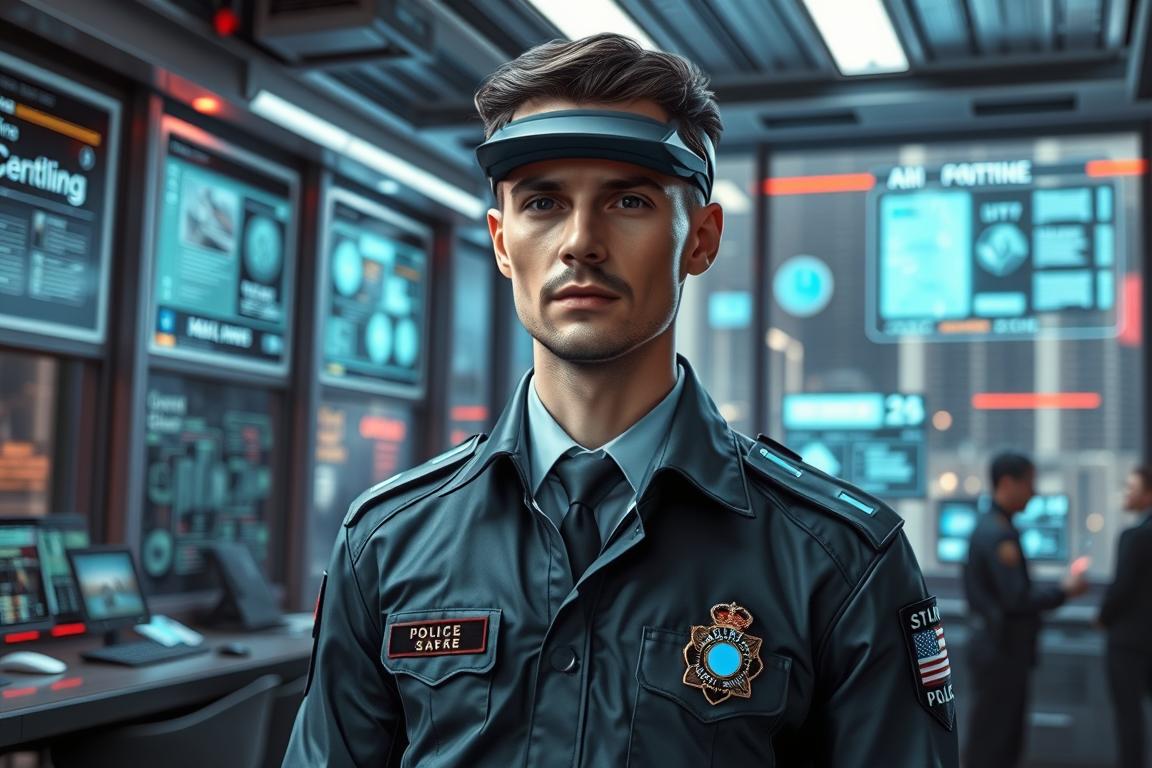Riley is a leading AI police detective in the law enforcement world. It uses advanced algorithms to sift through huge amounts of data. This AI combines smart technologies with old-school detective work, marking a big step forward in solving crimes.
Landmark cases show how important AI is in police work. For example, searching digital devices like cell phones is now key. With about 90% of crimes leaving digital clues, the need for tech and police to work together is clear.
Introduction to AI Police Detectives
AI police detectives are a big step forward in law enforcement. They use advanced data and machine learning to help solve crimes. This makes investigations faster and more accurate.
What is an AI Police Detective?
An AI police detective is a computer system that helps solve crimes. It looks through lots of data to find important clues. This lets police focus on the most important parts of an investigation.
The use of AI in policing is getting better all the time. It makes crime detection and prevention more effective.
The Evolution of AI in Law Enforcement
The role of AI in policing has changed a lot over time. We’ve moved from simple surveillance to advanced tools like facial recognition. These tools have made a big difference in fighting crime.
For example, PredPol has cut crime rates by up to 25% in some areas. As more money goes into AI, the crime analytics market is expected to grow. It’s set to reach $12.6 billion by 2027.
Meet Riley: Your Friendly AI Detective
Riley is the future of law enforcement help. It comes from a long line of AI detectives. This tech is made to solve tough crimes. Riley uses smart algorithms to look through lots of data and find patterns.
Background and Development of Riley
Riley was made to change how we solve crimes. It’s based on deep research into crime patterns and how detectives think. Riley can go through old cases and learn from them, making it a strong tool for police today.
How Riley Works to Solve Cases
Riley uses advanced tech to do deep investigations. It acts like a detective by:
- Looking at crime scene evidence closely
- Checking out suspects’ pasts and actions
- Guessing what crimes might happen next
- Helping with questions, giving smart insights
This lets Riley improve how we solve crimes. It makes sure we don’t miss anything in our search for justice.
The Role of AI in Modern Policing
AI has changed how police work today. It can make things more efficient, but there are hurdles to overcome. It’s important to know both the good and the bad of AI in police work.
Benefits of Using AI in Investigations
AI brings many benefits to investigations. Here are some:
- Enhanced accuracy in spotting crime patterns thanks to predictive analytics.
- Quicker response times by using data to plan better.
- Helps officers work smarter, making everyone safer.
- Can analyze big data like social media and CCTV fast.
- Helps avoid unfair targeting by focusing on crime types reported.
Challenges Faced by AI in Law Enforcement
Despite AI’s benefits, there are big challenges. These include:
- Algorithms can have biases, unfairly targeting some groups.
- Concerns about privacy when using surveillance tech.
- Trust issues due to unclear decision-making processes.
- Legal doubts about AI’s role in managing patrols.
- Need for audits to spot and fix biases.
To overcome these, police, data experts, and AI developers must work together. They need to keep learning and follow ethical rules to use AI wisely in policing.
Crime Scene Analysis with Riley
Crime scene analysis is key in law enforcement. Riley uses advanced technology to help. Evidence gathering AI makes it easier for officers to collect data. This means they spend less time on paperwork and can focus more on solving the case.
Gathering Evidence Efficiently
Riley uses top-notch AI for gathering evidence. This tech helps officers find and record important evidence better. It frees up a lot of time for officers, letting them focus on solving the case.
Analyzing Patterns and Trends
Riley is also great at analyzing patterns in law enforcement. It uses smart algorithms to study crime trends. This gives officers valuable information to prevent crimes and keep communities safe.
Enhancing Community Safety with AI
Riley is key in boosting community safety AI by working with local police. This partnership helps share info to stop crimes before they happen. It changes how police work, especially in fast-changing cities.
Collaborating with Local Law Enforcement
AI helps police work better and faster. It lets local agencies focus on the right places by spotting crime hotspots. AI also helps different police teams talk better, working together to fight crime.
Educating the Community on AI Benefits
Teaching people about AI policing builds trust. Workshops show how AI keeps us safe without taking our privacy. This helps communities see the good AI does in stopping crimes and keeping everyone safe.
Case Studies of Riley in Action
Many Riley case studies show how AI detectives change policing. These stories highlight how Riley’s advanced analytics solve tough cases. They prove AI is a game-changer in law enforcement.
Notable Success Stories
Riley has helped solve many complex cases across different places. It analyzes huge amounts of data to find links between suspects. This has given police a big advantage.
For instance, Riley helped take down a gang by uncovering their communication patterns. This led to arrests and broke up a larger crime network. These stories show how Riley is changing how investigations are done.
Lessons Learned from Real-World Applications
Using AI in policing has taught us a lot. Agencies learned the value of training people to work with AI. They also see the need to consider AI’s ethics.
It’s important to balance AI with human oversight to build trust. Lessons from Riley will help make AI a tool for better policing in the future.
Privacy and Ethics in AI Policing
AI in law enforcement brings up big questions about privacy and ethics. As police use AI, they face big challenges with data. They need to balance stopping crime with keeping personal info safe to keep trust.
Addressing Data Privacy Concerns
Privacy must be a top concern with AI in policing. Authorities should:
- Make sure data collection follows the law.
- Handle personal data in a way that’s open and fair.
- Tell people how their info is used.
- Check regularly to prevent privacy breaches.
AI can quickly go through huge amounts of data, like what’s on our phones. This makes police work better, but we must think about ethics. Police should not use data without proper checks.
Ethical Implications of AI Decision-Making
AI in policing raises big questions about fairness and bias. Algorithms might keep old biases, leading to unfair results. For example, predictive policing might unfairly target some areas if biases are not fixed.
- Facial recognition can wrongly identify people, especially women and minorities.
- It can lead to more police in certain areas, hurting those communities.
- It’s hard to see how these systems work, making it hard to hold anyone accountable.
To tackle these issues, AI and law enforcement need to work together. We need more diversity in tech and strict rules to ensure AI policing is fair. We must aim for a future where technology helps everyone equally.
The Future of AI Detectives in Law Enforcement
The world of law enforcement is changing fast with AI. Tools like Riley are making investigations better with new tech and methods. This could lead to fewer crimes and safer communities.
Upcoming Features and Innovations for Riley
Riley is getting better at handling digital evidence quickly. It uses advanced analytics to spot important details in videos and images. This helps investigators solve cases faster, making their work more efficient.
The Potential Impact on Crime Rates
AI detectives like Riley could really help lower crime rates. They use tools to predict and prevent crimes. This could make communities safer by catching trends early.
Integrating AI with Human Detectives
The use of AI, like Riley, changes how police work. AI-human collaboration in policing brings together AI’s power and human insight. This mix helps solve crimes more effectively.
Teamwork Between AI and Human Officers
Good investigations come from teamwork AI detectives. AI quickly sorts through lots of data, spotting patterns. Humans use their knowledge and thinking to fill in AI’s gaps.
This teamwork makes police work faster and more accurate. It helps them respond quickly to new cases.
Building Trust in AI Solutions
Trust in AI is key for police and the public. Being open about how AI works builds trust. Keeping personal info safe and following privacy laws is also important.
Building trust in AI means teaching about its benefits and answering concerns. It’s about showing how AI helps solve crimes and keeps communities safe.
Conclusion: The New Era of Crime Solving
The use of AI police detectives like Riley is changing law enforcement. It brings new ways to solve crimes. AI helps officers work faster and smarter, making police work better.
Recap of AI Police Detectives’ Benefits
Riley can spot patterns, find suspects, and watch over crime scenes. It uses advanced facial recognition. This makes communities safer.
It also helps find hidden trends and predict crimes. This is key for stopping crimes before they happen.
Final Thoughts on Riley’s Impact in Law Enforcement
There are still challenges, like proving AI’s findings in court and dealing with ethics. But Riley’s impact is clear. Police worldwide are getting better with new tech.
This leads to better communication between humans and AI. It makes solving crimes more efficient and fair. It’s a new start for police work.







